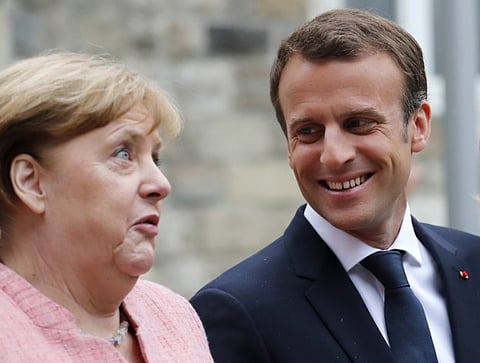Macron and Merkel hold the key to EU reform
If they fail to gain support before the European Council Summit in June, the plan to revive the bloc will remain a pipedream

The United States and the European Union do not see eye to eye on several issues as diverse as trade and security, which is why French President Emmanuel Macron and German Chancellor Angela Merkel crossed the Atlantic last month to meet with Donald Trump.
Some of the issues that affect the EU as a bloc, not just two of its larger member-states, are: a looming trade war over the US global tariff plan on steel and aluminium (where the EU is not exempted); US sanctions against the Syrian regime; the nuclear deal with Iran; and the US contribution to Nato which benefits EU more than the US.
In the EU, which prides itself on economic integration and political cooperation, common policies on trade and security are bound to be dealt with at supranational and intergovernmental levels. Trade relations with third countries and questions related to the security of the bloc are thus supposed to be conducted and represented around the world by a Trade Commissioner and the High Representative for Foreign Affairs and Security Policy.
Macron, who made a three-day visit, and Merkel with her one-day meeting devoted themselves to the same issues in the very same week. It raises the question why did two national leaders visit Washington DC in a week, instead of EU dignitaries.
With external trade and security of the bloc demarcated, it is up to the European Council — comprising the heads of state or government of the EU member states — to provide the EU with the necessary impetus for its development and define the general political guidelines. The council meets twice a year.
In Washington, Macron presented his own, pro-European vision to US Congress. Remarkably when viewed against France’s longstanding tradition to be a proud nation independent from the US, he articulated in English his plea for a stronger and political EU.
Discussing the US trade deficit, the importance of multilateral (free) trade, the nuclear deal and the geopolitical situation with Russia, Merkel appeared to seek a stronger Eurozone. She welcomed the idea to relaunch the EU, which includes an overhaul of its institutions, a Eurozone budget to cushion economic shocks, and a credible military capability.
In contemplating an EU reform drive, it is obvious that the two leaders are stepping into the emptiness of the bloc in terms of direction, vision and leadership. They had met each other in Berlin, ahead of their state visit to the US. The longstanding Franco-German relationship has in many ways been the catalyst of progress in the EU. So much so that nothing will happen within the EU without the full agreement of these two countries.
Although EU member-states recognise the need for institutional change, many of them are not thrilled with the reform proposals of European Commission President Jean-Claude Juncker that was laid out in his September 2017 State of the Union address.
A minister for economy and finance, a double-hatted presidency of the European Commission and the European Council, €1.135 billion (Dh4.9 billion) post-Brexit EU budget by 2018 are issues that need to be resolved. So far, the smaller member-states appear to show little enthusiasm, if not resistance.
Whether the EU engine of Macron and Merkel will be able to garner enough political support to reform the EU before the European Council Summit in June is yet to be seen. Or else, the plans of reinvigorating the EU will remain a pipedream.
Johann Weick is an expert in international trade policy, European integration and specialist in GCC-EU relations.



